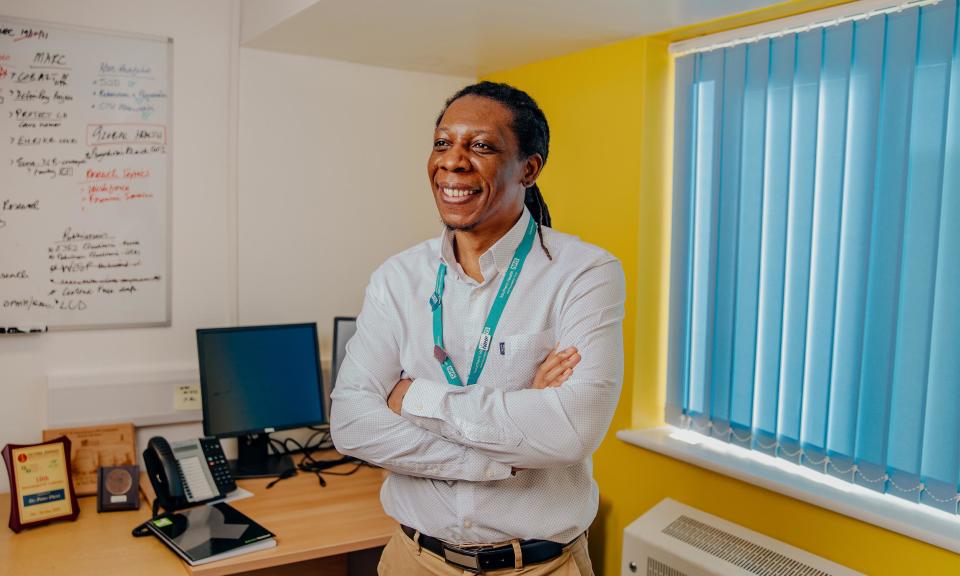‘We can analyse big data for one region’: how cloud-based software is streamlining clinical research

Whether it’s a global study into the psychological impact of Covid or UK-wide research on mental health, secure data-sharing is making it easier for Southern Health to collaborate
The importance of world-leading clinical research has never been more apparent than over the past 18 months. In 2020-21, more than 1.39 million people in England took part in studies sponsored by the National Institute for Health Research (NIHR), the largest number the government body has had, and close to double that for 2019-20. Around 1 million of that total were recruited to take part in research investigating new treatments and developing vaccines for Covid-19.
“Research is one of the most exciting areas of healthcare,” says Dr Peter Phiri, research and development manager at the Southern Health NHS foundation trust in Southampton. “It’s about enquiry, finding solutions and testing assumptions. And when you hear about the impact, it’s so rewarding. Because we’ve all been benefactors of research conducted at one time or another.”
Southern Health is part of the Wessex Clinical Research Network (CRN), one of 15 CRNs that deliver health and social care research across England – much of which is funded by NIHR. Southern Health is currently running a large observational study, with Prof Shanaya Rathod and Phiri on the team, to investigate the psychological impact of the Covid-19 pandemic and the restrictions imposed on people worldwide.
More than 188,000 participants have been recruited in the UK and internationally, with the initial findings of a smaller, mainly UK-based, sample suggesting that healthcare workers have experienced mild depression and anxiety in higher proportions than others. “We recognise the pandemic will impact everyone differently,” says Phiri. “Therefore identifying specific mental healthcare requirements is key.”
Beyond the impact of Covid-19, the trust conducts studies into many areas of mental and physical health, including psychosis, depression, stroke, diabetes, cardiac conditions, dementia and long-term neurological conditions. “Our research portfolio is very broad, whether it’s finding cures or better treatments or improving the quality of care for patients,” says Phiri. “Research has benefits for our organisation and employees too. Our vision is to encourage and embed a culture of research that gives every patient, carer and member of staff an opportunity to take part.”
Technology is essential, not least because of the sheer volume of data collected from thousands of participants. Data management systems have become essential for the team, and Qualtrics Core XM has been a gamechanger in terms of designing and distributing study questionnaires since they started using it in 2020. “Prior to using Qualtrics, we had another platform for staff surveys but we couldn’t use it for patient-related research because of strict data-privacy rules,” says Phiri.
The platform also comes with its own statistical analysis package, which Phiri has found useful for evaluating whether the participant cohort is weighted too heavily towards one particular group. “That’s one of the biggest challenges with observational studies,” he says. “Sometimes you get more of one group – whether it’s younger or older people, women or men – completing the surveys. In Qualtrics, you can quickly see that distribution, so you can do more recruitment and advertising targeted at a specific group. It’s really useful and unlike any other platform I’ve used before.”
Collaboration is streamlined whether other research teams are based elsewhere in the UK or abroad. That proved particularly helpful during the team’s recent Covid research. “I can open a study and invite other partners to collaborate without having to actively share the data with them. It all stays within the platform,” says Phiri.
Moving forward, facilitating this secure data sharing will have wider benefits for healthcare research. Southern Health is one of the 14 NHS mental health trusts UK-wide that are part of the Clinical Record Interactive Search system (CRIS) network. The research platform harnesses more than 2m de-identified patient records to advance research into dementia and mental health. “It means we can analyse big data in one area,” Phiri says. “I can run a study in Southern Health, and link up with the other 13 trusts to run the same study there digitally. That means the results are going to be generalisable across the country.”
It also speeds up the application of theoretical research to real-life settings. “There’s always been this notion around research that it takes 17 years to translate from the lab to clinical practice,” Phiri says. “We’ve been working hard to reduce that transition phase. These types of platforms are one key way for us to do that.”
He sees potential for the use of digital questionnaires in other areas of healthcare. Outcome measure assessments, for example, are usually conducted using paper-based questionnaires when the patient enters a service, and at regular intervals to measure progression and treatment outcomes. “That’s always been a challenge for clinicians across the country,” Phiri says. “Collecting paper-based outcome measures, uploading them on to a system and then linking them up with electronic patient records. With Qualtrics, the questionnaires are automated, can be used on any device and are easily linked with the patient’s clinical data. There are lots of untapped opportunities.”
After an unprecedented 18 months, he is optimistic about the future of clinical research, bolstered by technology. “The acceleration of use of these platforms enables us to meet patients wherever they are,” he says. “We’re already considering running fully remote or hybrid trials. It brings about flexibility, so we can provide multiple solutions to different groups of people who wouldn’t otherwise participate. And it enables us to link the available data so we can get a fuller picture of an individual’s treatment plan.”
SAP solutions help clients optimise processes, deliver better public value, stay agile, and be ready to change quickly

 Yahoo News
Yahoo News 